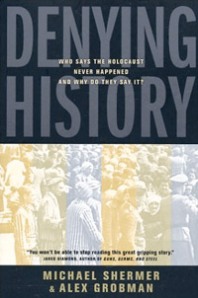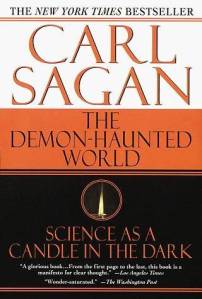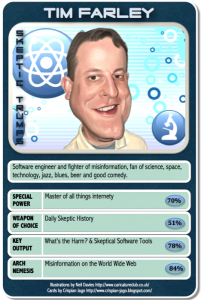Denying History
“Where everyone’s opinion is equal to everyone else’s opinion, no one’s opinion matters.”
Title: Denying History: Who Says the Holocaust Never Happened and Why Do They Say It?
Author: Michael Shermer & Alex Grobman
Year of Publication: 2000
Genre Keywords: censorship, evidence, free speech, history, Holocaust, Holocaust denial, ideology, logic, Nazism, neo-Nazism, scholarship, skepticism.
Summary: A smart and readable book about the phenomenon of modern Holocaust denial, written by two authors committed to the accurate understanding and portrayal of history. They begin by warning against silencing the people who deny that the Holocaust took place – instead, they argue persuasively, it’s best to place the beliefs of Holocaust deniers under a microscope, to seek flaws in logic and ideological motivations. There is a factual truth in history, and only by exposing the truth can we defeat the lies and misrepresentations of deniers.
Shermer and Grobman then go on to discuss the Holocaust denial movement’s ideological underpinnings – who says the Holocaust never happened and why they say it. (They also go into how Holocaust deniers use logical fallacies and twist the evidence to suit their purposes by outlining the deniers’ main arguments.) Then they go into the historical evidence to examine the major tenets of Holocaust denial: the ideas that concentration camps were not used for extermination, that the extermination of Jews was not a part of Hitler’s plan, and that the number exterminated was less than six million or even one million. As most of us would probably expect, they find that the majority of evidence disproves the deniers’ claims.
Who’ll Love It: Any readers concerned with the Holocaust have probably already decided they want to read this book. But more broadly, those interested in truth and misinformation – and how people with an agenda can manipulate the truth to spread bad information – should definitely look at this.
A Question for Librarians: The issue of free speech in this case is complicated enough that Shermer & Grobman could have written the entire book on just that question alone. It’s an issue that arises in library studies as well. Most of us agree with the authors’ persuasive point that misinformation is best defeated by an honest, careful study of the evidence, not by censoring deniers’ views. After all, censorship gives their ideas a power they don’t deserve. But on the other hand, would you put Holocaust deniers’ books on the shelves of your library? Would you give them a platform? And if they argued that your refusal to make their ideas accessible amounted to a form of passive censorship, what would you say?



